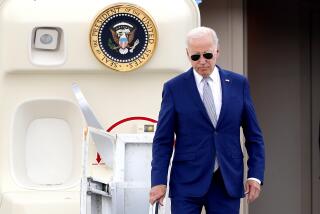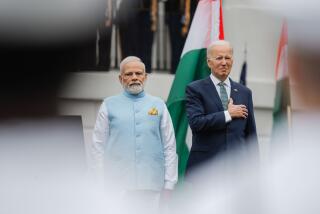Gandhi Asserts U.S. Is a Friend : But He Disputes Afghan Policy, ‘Star Wars’ Plan
- Share via
WASHINGTON — Prime Minister Rajiv Gandhi of India, addressing both houses of Congress on Thursday, declared his country a friend of the United States in the cause of freedom, justice and peace but peppered his speech with criticism of U.S. policy on Afghanistan, Pakistan, foreign aid and the “Star Wars” missile defense plan.
The 40-year-old son of the assassinated Indira Gandhi, his predecessor as prime minister, cushioned his criticism with an amiable and sometimes humorous style that won a 90-second standing ovation from the senators, representatives, aides and government officials in the standing-room-only crowd in the House of Representatives chamber.
But there was no mistaking his meaning as he equated the Soviet invasion of Afghanistan with U.S. aid to the Afghan rebels resisting the Soviets and the Soviet-backed Afghan government, objected to U.S. arms sales to Pakistan, called the “Star Wars” program a “new dimension to the arms race” and complained about declining levels of U.S. foreign aid.
Although Gandhi said that his visit to the United States “will help to bring about greater understanding between our two countries,” he gave no indication that he is prepared to move India closer to the United States in its global rivalry with the Soviet Union. In other appearances, he made clear that he is not interested in an offer to allow India to buy U.S. weaponry.
“We are willing to sell arms to India,” State Department spokesman Bernard Kalb said. “We are prepared for more active arms relations, if the Indians so desire.”
But a senior Indian official said that the New Delhi regime is reluctant to become dependent on U.S. arms, which he said often are sold with political strings attached. The official said that India has found the Soviet Union to be a dependable supplier of weapons while it is not sure about U.S. reliability.
Arms Sales Ended in ’65
The United States ended large-scale sales of arms to India in 1965 with the outbreak of the Indian-Pakistani war.
However, the official admitted that India’s military commanders would like to obtain some high-technology systems that are not available from Moscow.
In his speech to Congress, Gandhi said that India is interested in obtaining civilian technology from the United States. “Our governments have recently reached an understanding on the export of high technology from the U.S. to India,” he said. “We see this as the beginning of a substantial partnership to our mutual benefit.”
‘Human Causes’
Gandhi drew a chuckle when he said, in a reference to the Boston Tea Party, “It was Indian tea that stimulated your independence movement.” And he emphasized shared values: “The peoples of India and the United States are not allies in security strategies, but they are friends in larger human causes--freedom, justice and peace.”
He refused to condemn the Soviet invasion of Afghanistan but said, in a clear reference both to the invasion and to U.S. aid to the rebels there, “Outside interference and intervention have put in jeopardy the stability, security and programs of the region. We are opposed to both foreign presences and pressures. The one is advanced as a justification for the other.”
In referring to the “Star Wars” missile defense effort, Gandhi said, “We are concerned about any new dimensions to the arms race . . . hence, our deep reservation about the militarization of outer space.”
More to Read
Sign up for Essential California
The most important California stories and recommendations in your inbox every morning.
You may occasionally receive promotional content from the Los Angeles Times.













